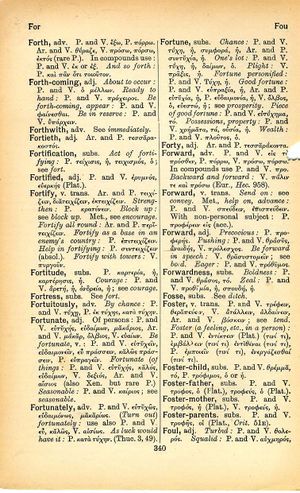fortunate
κακοὶ μάρτυρες ἀνθρώποισιν ὀφθαλμοὶ καὶ ὦτα βαρβάρους ψυχὰς ἐχόντων → eyes and ears are poor witnesses for men if their souls do not understand the language (Heraclitus Phil.: Fr. B 107; Testimonia: Fragment 16, line 6)
English > Greek (Woodhouse)
adj.
Of persons: P. and V. εὐτυχής, εὐδαίμων, μακάριος, Ar. and V. μάκαρ, ὄλβιος, V. εὐαίων. Be fortunate, v.: P. and V. εὐτυχεῖν, εὐδαιμονεῖν, εὖ πράσσειν, καλῶς πράσσειν, P. εὐπραγεῖν. Fortunate (of things: P. and V. εὐτυχής, καλός, εὐδαίμων, V. δεξιός, Ar. and V. αἴσιος (also Xen. but rare P.). Seasonable: P. and V. καίριος; see seasonable.
Latin > English (Lewis & Short)
fortūnātē: adv., v. fortuno,
I P. a. fin.
Latin > French (Gaffiot 2016)
fortūnātē¹⁵ (fortunatus), adv., d’une manière heureuse : Cic. Fin. 3, 26 || -tius Plin. 3, 125.
Latin > German (Georges)
fortūnātē, Adv. (fortunatus), gesegnet, beglückt, glücklich, quam facile et quam fortunate evenit illi, obsecro, mulieri, quam liberare volt amator, Plaut. Epid. 243: bene et f. vivere, Plaut. mil. 706: semper feliciter, absolute, f. vivere, Cic. de fin. 3, 26: nihil satis scite aut f. gestum esse, Liv. 10, 18, 5.
Latin > English
fortunate ADV :: fortunately

